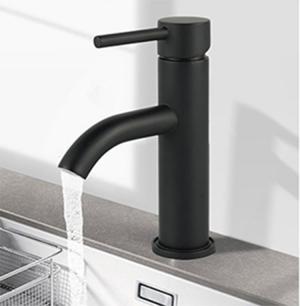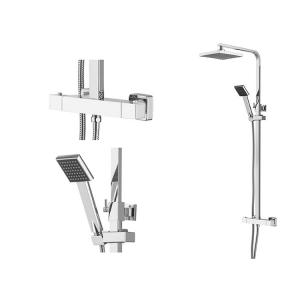
- English
- Español
- Português
- русский
- Français
- 日本語
- Deutsch
- tiếng Việt
- Italiano
- Nederlands
- ภาษาไทย
- Polski
- 한국어
- Svenska
- magyar
- Malay
- বাংলা ভাষার
- Dansk
- Suomi
- हिन्दी
- Pilipino
- Türkçe
- Gaeilge
- العربية
- Indonesia
- Norsk
- تمل
- český
- ελληνικά
- український
- Javanese
- فارسی
- தமிழ்
- తెలుగు
- नेपाली
- Burmese
- български
- ລາວ
- Latine
- Қазақша
- Euskal
- Azərbaycan
- Slovenský jazyk
- Македонски
- Lietuvos
- Eesti Keel
- Română
- Slovenski
- मराठी
- Srpski језик
How to choose a suitable bathtub faucet?
2025-09-16
The bathtub faucet is the commander of the cold and hot water during our bath. So, how can we select a suitable bathtub faucet from the wide variety of hardware products?

Installation compatibility:
The installation method of the bathtub faucet is very important. First, clearly understand the water supply structure and installation conditions of the bathtub in your home. If the wall-mounted water pipe interface has been pre-installed during the renovation, the wall-mounted faucet is the most simple and elegant choice. It only exposes the control panel and the water outlet, saving space and facilitating cleaning, but it requires extremely high accuracy in the pre-installation, and even a slight deviation may prevent installation. If the water pipe extends from the ground, the floor-standing faucet is the inevitable choice. Its base stands firmly on the side of the bathtub, with built-in supporting columns. Ensure that the height of the columns exceeds the edge of the bathtub and measure the horizontal distance between the water inlet of the bathtub and the water outlet of the faucet to avoid water splashing. The wall-mounted faucet is in between the two. It needs to be fixed on the load-bearing wall on the side of the bathtub, suitable for layouts without ground pipes and where the wall can be grooved. Incorrect installation methods may result in inability to use or even water leakage risks. Be sure to take photos of the water pipe interfaces in your home and consult the merchant or plumber before purchasing.
Selection of valve core and material:
The selection of the valve core and material for the bathtub faucet is very important. The valve core controls the opening and closing accuracy and lifespan. Ceramic valve cores are the mainstream in the market. They are wear-resistant, corrosion-resistant, and have a light feel, but inferior ceramics are prone to cracking due to scale. If your home has extremely hard water and severe scale, stainless steel valve cores are more durable, but they have more rotation turns and slightly slower temperature adjustment. The main body material is next. National standard H59 copper is the best choice. Its natural antibacterial property meets drinking water standards, and the inner wall is smooth and not prone to accumulation. If your budget is limited, you can choose 304 stainless steel, but inferior stainless steel may leach heavy metals. Zinc alloy is the least choice. Although it is cheap, it is porous and prone to cracking and leaking in a humid environment. It is only recommended for short-term rental properties.

Selection of function design:
The functions of bathtub faucets have already gone beyond basic water supply. If you are accustomed to cleaning your body or cleaning corners in the bathtub, you can choose a faucet with a handheld shower function. When choosing, pay attention to the length of the hose and the position of the shower bracket to see if they are convenient. It is recommended to choose a button-switching type rather than a pull-down shower divider. The latter is prone to slipping when wet hands operate. For families with elderly or children, a constant temperature faucet can completely eliminate the risk of burns. If the space is small or you pursue the ultimate simplicity, an integrated three-in-one faucet combines the cold and hot switch, the shower divider, and the water outlet on a single column; while the split design is more suitable for larger bathrooms, adding a retro sense of ceremony.
Maintenance and care:
Maintenance tips: Responding with care to the daily gifts
Daily cleaning of the bathtub faucet should be done with a microfiber cloth dipped in water. For stubborn scale, apply lemon acid solution for ten minutes and then gently brush. Do not use steel wool or strong acid cleaners, as they will tear the electroplated layer and expose the underlying metal. If there is unstable water temperature or reduced water flow, it may be due to clogged valve core filter. After closing the angle valve, remove the valve core for cleaning. In winter, if the bathroom temperature may be lower than 5°C, pay attention to emptying the water in the faucet to prevent freezing and cracking.
| Selection Aspect | Key Factor | Recommendation/Note |
|---|---|---|
| Installation Type | Pre-installed wall pipes | Wall-mounted faucet [Space-saving elegant] |
| Exposed floor pipes | Floor-standing faucet [Measure height/distance] | |
| Side-wall mounting possible | Deck-mounted faucet [Requires load-bearing wall] | |
| Valve Core | Standard water conditions | High-quality ceramic core [Smooth operation] |
| Hard water areas | Stainless steel core [Scale resistance] | |
| Body Material | Optimal choice | H59 copper [Antibacterial durable] |
| Budget option | Verified 304 stainless [Check certifications] | |
| Avoid | Zinc alloy [Prone to corrosion leaks] | |
| Functions | Tub cleaning convenience | Handheld shower [1.5m+ hose button switch] |
| Safety priority | Thermostatic valve [Prevent scalding] | |
| Compact spaces | Single-hole three-function design | |
| Larger bathrooms | Widespread design [Retro aesthetic] | |
| Spout Design | Water trajectory | Ensure adequate reach over tub center |
| Finish Durability | Standard protection | Chrome plating [9+ grade salt test] |
| Premium finishes | PVD coating [Rose gold gunmetal options] | |
| Low maintenance | Brushed metal [Hides fingerprints] | |
| Maintenance | Daily cleaning | Microfiber cloth + water |
| Descaling | Lemon juice/white vinegar soak | |
| Avoid | Abrasives acidic cleaners | |
| Winter care | Drain pipes below 5°C | |
| Flow Issues | Reduced pressure | Clean aerator valve core filter |



